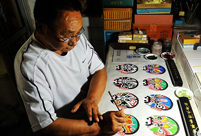 Ceremony volunteers for Youth Olympics make public appearance
Ceremony volunteers for Youth Olympics make public appearance
 A glimpse of female crew of Liaoning aircraft carrier
A glimpse of female crew of Liaoning aircraft carrier
 Stills from "Dad, where are we going?"
Stills from "Dad, where are we going?"
 Legless man's happy life
Legless man's happy life
 Top ten most beautiful islands in China
Top ten most beautiful islands in China
 Aerial view of Hong Kong
Aerial view of Hong Kong
 Happy life in Xinjiang
Happy life in Xinjiang
 2014 China Hainan Int'l Automotive Exhibition kicks off
2014 China Hainan Int'l Automotive Exhibition kicks off
 Collection of 'China Dream' public-spirited ads
Collection of 'China Dream' public-spirited ads
 The silent holy stones
The silent holy stones
Senior official sends clear message to Hong Kong public over bottom line
Hong Kong has to "strictly follow" the Basic Law in implementing its electoral reform for the 2017 leadership election, China's top legislator told Hong Kong's chief executive in a rare meeting in Shenzhen over the weekend, days after the city's submission of an election report.
"We have to strictly follow the provisions of the Basic Law and also the stipulations of the National People's Congress (NPC) Standing Committee's decisions," said Hong Kong Chief Executive Leung Chun-ying, quoting the words of Zhang Dejiang, chairman of the NPC Standing Committee, at their most recent meeting.
Leung told reporters Saturday afternoon he and three other senior government officials had met Zhang on Saturday morning, who went from Beijing to Shenzhen, four days after receiving the report submitted by Leung on Hong Kong's political reform.
The Hong Kong-based South China Morning Post described the meeting as a surprise, as it is the first time the chairman of the nation's top legislature has travelled to Shenzhen to discuss political reform with Hong Kong leaders.
Beijing's representative also met with Hong Kong's political party and business leaders during his stay in Shenzhen. In a meeting with the Liberal Party, Zhang expressed concern regarding foreign intervention over Hong Kong matters and called it "unacceptable," reported Commercial Radio Hong Kong.
His remark came after Hong Kong democracy activists Anson Chan Fang On-sang and Martin Lee Chu-ming met with the UK Deputy Prime Minister Nick Clegg to discuss the city's political reform earlier in July.
"Through the meeting, Zhang has sent a clear message to the Hong Kong public about the bottom line of the central government, that [the 2017 election] has to follow the Basic Law, the new Hong Kong leader should be a person who 'loves the country and loves Hong Kong,' and the nomination committee will operate with 'organizational nomination,'" Priscilla Lau Pui-king, a Hong Kong deputy to the NPC, told the Global Times.
Based on public opinions collected during the five-month consultation, the Hong Kong government on July 15 submitted a report suggesting amendments to the methods for choosing the city's next leader in 2017, making clear that only the nomination committee has a "substantive power" to put forward candidates.
Leung said the meeting did not touch on Occupy Central, a movement initiated by pro-democracy campaigners that plans to blockade the city's central business district in bargaining for civic nomination.
But Commercial Radio Hong Kong reported that Zhang agreed with the worries in opposing the Occupy Central expressed by business leaders during their Saturday meeting, and unambiguously told them that civic nomination is not acceptable.
On the same day of the Saturday meeting, the Alliance for Peace and Democracy, an anti-Occupy Central campaign launched a campaign to collect signatures as expressions against Occupy Central.
A total of 416 stands were set up in the city, which demand signatories present their identification cards.
"We want to tell them [Occupy Central campaigners] that majority of the Hong Kong public expect universal suffrage to come, but only in a peaceful, non-violent way," Robert Chow Yung, the group spokesman, told the Global Times.
The month-long campaign, initiated by the alliance formed by over 1,100 groups, aimed to collect over 800,000 signatures, and claimed to have collected over 380,000 on the first two days.
The goal is higher than the over 790,000 votes Occupy Central claimed to have been cast in a so-called referendum over electoral reform, while the majority of the votes were cast online so regarded by some as not credible.
"Occupy Central only managed to attract a 70,000 turnout in their physical voting station, while the number of the signatures we collected are already three times more than theirs," said Chow on Sunday.
 Moms on their kid’s coming out
Moms on their kid’s coming out Chinese fighters through lens
Chinese fighters through lens
 Children attend gymnastics training in summer
Children attend gymnastics training in summer
 Beautiful sceneries along the special travel route in Xinjiang
Beautiful sceneries along the special travel route in Xinjiang
 Beauty SWAT member in Xinjiang sparks online frenzy
Beauty SWAT member in Xinjiang sparks online frenzy
 Germany beat Argentina 1-0 to win World Cup
Germany beat Argentina 1-0 to win World Cup
 National fitness team members integrate traditional and modern beauty
National fitness team members integrate traditional and modern beauty Collection of 'China Dream' public-spirited ads
Collection of 'China Dream' public-spirited ads  How Chinese men kill the time when their wives practice square dancing?
How Chinese men kill the time when their wives practice square dancing? Top 10 most beautiful islands in China
Top 10 most beautiful islands in China
 Zhou Xun announces engagement to Archie Gao
Zhou Xun announces engagement to Archie Gao
 Photos of the Week
(July 6 - July 12)
Photos of the Week
(July 6 - July 12)
 'Super moon' seen in Beijing
'Super moon' seen in Beijing
 One-legged women with high heel goes viral on Internet
One-legged women with high heel goes viral on Internet China's largest 3D printer builds 2-meter-long boat
China's largest 3D printer builds 2-meter-long boat
Day|Week|Month